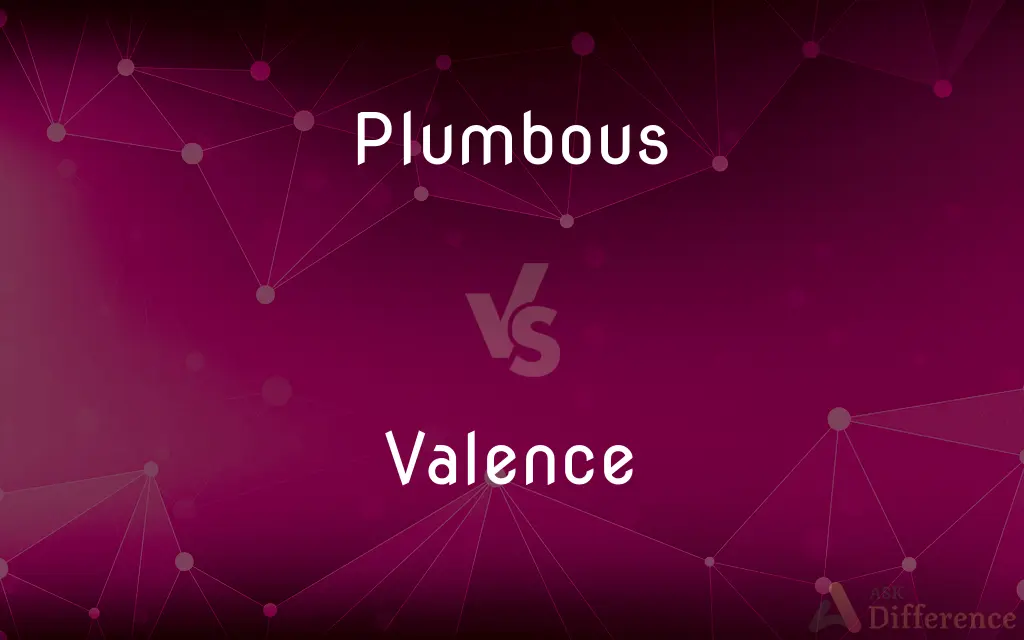Plumbous vs. Valence — What's the Difference?

Difference Between Plumbous and Valence
ADVERTISEMENT
Compare with Definitions
Plumbous
(chemistry) Of, pertaining to, resembling or containing lead.
Valence
Another term for valency
Plumbous
(chemistry) Specifically, of compounds in which it has a lower valence as contrasted with plumbic compounds.
Valence
The combining capacity of an atom or group of atoms as determined by the number of electrons it can lose, add, or share when it reacts with other atoms or groups. Also called oxidation state.
Plumbous
Of, pertaining to, or containing, lead; - used specifically to designate those compounds in which it has a lower valence as contrasted with plumbic compounds.
ADVERTISEMENT
Valence
An integer used to represent this capacity, which may be given as positive or negative depending on whether electrons are lost or gained, respectively
The valences of copper are +1 and +2.
Plumbous
Relating to or consisting of lead
Valence
The number of binding sites of a molecule, such as an antibody or antigen.
Valence
The number of different antigens contained in a vaccine, corresponding to the number of pathogens that it is active against.
Valence
(Psychology) The degree of attraction or aversion that an individual feels toward a specific object or event.
Valence
(Linguistics) The number and type of arguments that a lexical item, especially a verb, can combine with to make a syntactically well-formed sentence, often along with a description of the categories of those constituents. Intransitive verbs (appear, arrive) have a valence of one—the subject; some transitive verbs (paint, touch), two—the subject and direct object; other transitive verbs (ask, give), three—the subject, direct object, and indirect object.
Valence
The capacity of something to unite, react, or interact with something else
"I do not claim to know much more about novels than the writing of them, but I cannot imagine one set in the breathing world which lacks any moral valence" (Robert Stone).
Valence
The combining capacity of an atom, functional group, or radical determined by the number of atoms of hydrogen with which it will unite, or the number of electrons that it will gain, lose, or share when it combines with other atoms, etc.
Valence
The number of binding sites of a molecule, such as an antibody or antigen.
Valence
The number of arguments that a verb can have, including its subject, ranging from zero to three or, less commonly, four.
In this assignment you will analyze each of the following sentences and determine the valence of the highlighted verb.
Valence
A one-dimensional value assigned by a person to an object, situation, or state, that can usually be positive (causing a feeling of attraction) or negative (repulsion).
Anger and fear have negative valence
Valence
The value which a person places on something.
Valence
Alternative spelling of valance
Valence
The degree of combining power of an atom (or radical) as shown by the number of atoms of hydrogen (or of other monads, as chlorine, sodium, etc.) with which it will combine, or for which it can be substituted, or with which it can be compared; thus, an atom of hydrogen is a monad, and has a valence of one; the atoms of oxygen, nitrogen, and carbon are respectively dyads, triads, and tetrads, and have a valence respectively of two, three, and four.
Valence
(biology) a relative capacity to unite or react or interact as with antigens or a biological substrate
Valence
(chemistry) a property of atoms or radicals; their combining power given in terms of the number of hydrogen atoms (or the equivalent)
Share Your Discovery

Previous Comparison
Barrister vs. Templar
Next Comparison
Even vs. Event













































